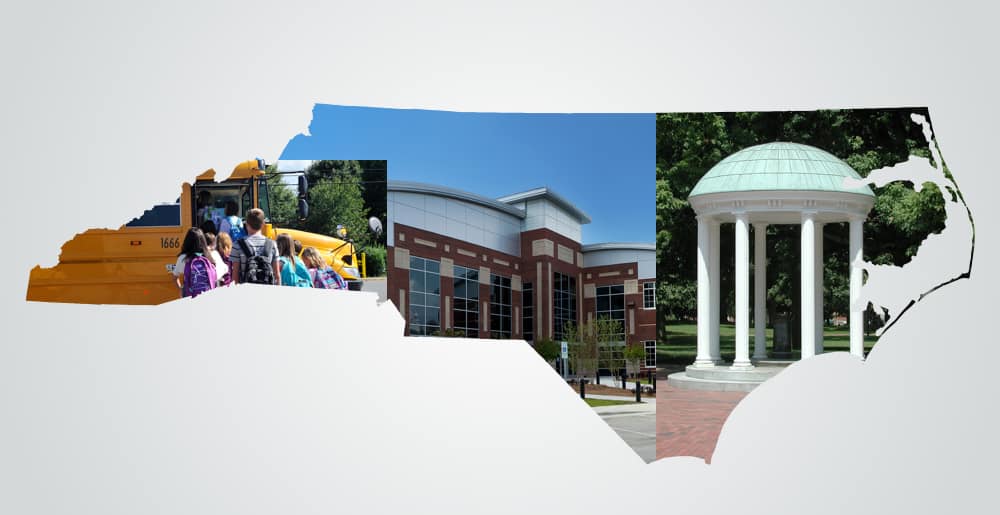
Thrive in North Carolina, the website of the Economic Development Partnership of North Carolina, delivers a powerful message about education in our state. It boasts of the quality of the state’s three education systems — K-12, community colleges, and universities — as a compelling rationale for businesses to expand in or relocate to North Carolina.
The Economic Development Partnership is the new nonprofit organization that Gov. Pat McCrory and the Republican-majority in the General Assembly created to spearhead business recruitment. By its nature, the organization boasts about what it regards as assets that promote the state and persuade site selectors and corporate executives.
Here’s how the education chapter of the Thrive in NC fact book begins:
“North Carolina has consistently made significant investments in education. With the state’s leadership in early education, especially pre-kindergarten, the state has been recognized as a national model being replicated across America.”
“North Carolina leads the country in the number of National Board Certified teachers and has cultivated increasingly accountable public schools in which students are performing above southeastern and national averages.”
The fact book goes on for several pages in describing North Carolina schools, colleges and universities in tone and substance distinctly different from what you often hear and observe in the Legislative Building. There, it seems, the operating premise is to redirect, reject or depart from the initiatives and policies of the recent past.
In seeking to lure businesses to North Carolina, Thrive in NC boasts of an array of state educational initiatives and investments, most of which originated in the administrations of former Democratic governors. It hails Smart Start and the fact that North Carolina has 20 percent of the nation’s board-certified teachers, both signature initiatives of former Gov. Jim Hunt. It spotlights the New Schools Project and NC Pre-K, both stemming from initiatives of former Gov. Mike Easley. It outlines the dimensions of Career & College Promise, an initiative of former Gov. Bev Perdue that allows high school students to earn community-college credits.
“North Carolina’s investment in education continues through increasingly accountable public schools,” says the economic unit’s website, which tells potential business recruits that they can find annual school report cards online with information about student performance, class size, school safety and teacher quality. It describes North Carolina as a “national leader in education excellence,’’ and boasts of SAT results, AP exam participation and NAEP scores that show North Carolina “at or above the national average in 4th and 8th grade math and 4th grade reading.”
Thrive in NC describes higher education as “perhaps the state’s strongest educational asset.” In its treatment of higher education, the economic partnership includes the 16 public universities, 36 private colleges and universities, and 58 community colleges.
“North Carolina’s community college system,” says the education section, “is prized for pioneering customized workforce training programs and is widely regarded as having the nation’s most comprehensive and advanced program of vocational and technical education.”
Thrive in NC takes note of North Carolina’s “tradition of excellence” in its public universities, and it comments that “the UNC system receives strong financial support from the state, making it among the least expensive public educations in the country, with tuition below the national average.”
Of course, it is not the role of an economic development unit to provide commentary on today’s political and policy debates. Thus, Thrive in NC says nothing about teacher pay and career status, about whether early childhood education is funded adequately, about state support for universities and rising tuition, or about persistent challenges to meet the educational needs of children from poor and near-poor families.
Still, the economic partnership tells a truthful, if rhetorically glossy, story. North Carolina has become a more attractive state in large part from such education-related initiatives as Smart Start, More at Four (reengineered as NC Pre-K), the New Schools Project and Career and College Promise — and through long-term investments in community colleges and universities.
“North Carolina offers one of the nation’s most renowned education systems, supplying companies a pipeline of skilled workers while providing its citizens ample opportunities to learn, grow and thrive in the 21st century economy,’’
says the Thrive in NC website.
Thrive in NC sets the stage for the decisions that legislators and the governor will make in determining the 2015-16 state budget, and for the debates to come in the 2016 state campaigns. The story the state’s promoters tell illuminates the importance of leadership that invests in education.
Here is the Quality Education Systems Chapter of Thrive in North Carolina’s Fact Book.
Recommended reading



